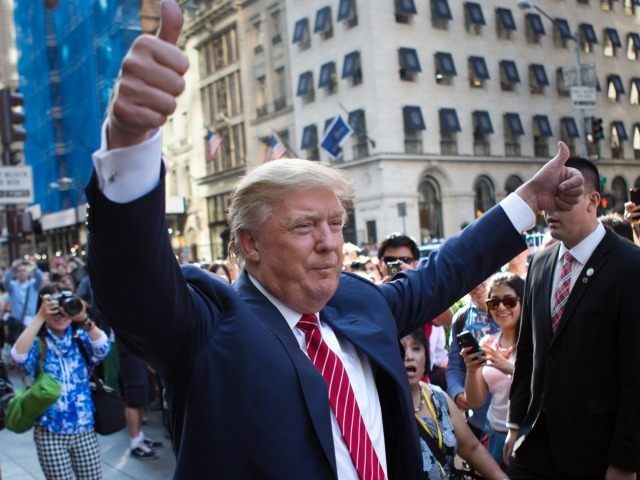The latest polling data from Reuters finds voters shifting support to Donald Trump in the days following the Orlando terrorist attack.
Prior to the attack, Hillary Clinton led Trump by almost 15 points in the Reuters tracking survey. In the latest results, Clinton leads Trump by 10 points.
The results run counter to the media narrative since the terrorist attack in Florida. Politico, for example, has run half-a-dozen stories this week exploring how Trump “flubbed” his response to the attack. Voters, however, don’t simply look at snap political statements in the wake of significant events to gauge candidates. The specifics of events themselves can shift the political landscape.
The Reuters survey is based on a five-day rolling average of interviews with around 1,200 likely voters. Most polls capture a snap-shot of the race within a small window of time. Many of the polls released this week included a large number of interviews conducted prior to the Orlando attack.
The overwhelming majority of interviews in the widely cited Bloomberg poll earlier this week, for example, were conducted before the terrorist attack. That survey showed Hillary Clinton leading Donald Trump by 12 points. The poll was released, of course, after the country was reeling from the aftermath of the Orlando attack and was breathlessly reported by the media as somehow reflecting the state of the race. The poll itself, though, was outdated as soon as Omar Mateen murdered 49 people in his own act of jihad.
Terrorism has shot back to the top of voters’ concerns since the Orlando attack. In early May, terrorism was a distant third on the issues most important to voters, according to Reuters data. It was essentially tied with a host of other issues, including healthcare, unemployment and immigration.
By mid-week, however, terrorism was again the number one issue on voters’ minds, edging out concerns over the economy. All other issues, like healthcare and immigration, had slipped to the low-single digits. Support for a temporary ban on Muslims also increased. Today, a plurality of voters support a ban on Muslim immigration into the US. A small majority of likely voters support a ban.
At the end of May, a solid majority of voters opposed such a ban.
Practically speaking, a blanket ban, even temporary, on Muslim immigration into the U.S. is unworkable. It is hard to imagine how such a policy could be crafted or implemented. It would likely be tied up in litigation long before it came into effect. Indeed, House Republican Speaker Paul Ryan, showing the aggressivness Republicans only show to each other, threatened to sue a President Trump over such a proposal.
That said, a ban is supported by a large segment of voters. Politically, it is a split decision, with equal numbers of voters supporting and opposing a ban. This alone speaks volumes about the frustrations and distrust voters have with political leaders today. A blanket ban, after all, makes sense if one doesn’t trust the government or political leaders to enforce existing laws or pursue potential threats with the necessary vigor.
The attack by Omar Mateen exposed, again, multiple failures of law enforcement or federal authorities to recognize potential threats. A blanket ban simply saves us the consequences of future bad decisions by federal authorities.
With terrorism catapulting back to the top of voters’ concerns and support for a ban on Muslim immigrants increasing, it isn’t surprising that Trump has gained in the polls this week. Events like the Orlando terrorist attack shape a Presidential campaign far more than the real-time statements and punditry that fills cable news hours.
Hillary Clinton’s strong showing in polls conducted before the Orlando attack also weren’t surprising. She had finally “won” her primary against Vermont socialist Sen. Bernie Sanders, according to the media. Her campaign was enveloped by warm headlines about this or that national Democrat figure endorsing her campaign in the wake of her victory.
Her campaign “success” was the story of last week, just as Trump’s primary campaign success was story in the final weeks of May. Trump got a poll bump in the wake of his victory, just as Hillary Clinton was receiving a bump from her win.
And, then, Orlando happened.
Former UK Prime Minister Harold Macmillan was famously asked by a journalist what could derail his government’s plans. “Events, my dear boy, events,” Macmillan is alleged to have responded.
A great deal of a Presidential campaign is already “baked into the cake,” because of particular demographics, partisan loyalties, the overall economy and unique features of each candidate. Outside macro-events, though, can change the trajectory.
The financial crash in late 2008 altered that election in ways that couldn’t have been forseen. The Orlando attack is already changing the opening days of the general election. Hillary Clinton was set to dominate polling for at least a few weeks following her primary win. Her polling honeymoon, however, seems to have ended just days after she left the Democrat alter.
Orlando was certainly an event. It may have sparked another change in the Presidential race.

COMMENTS
Please let us know if you're having issues with commenting.